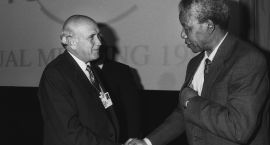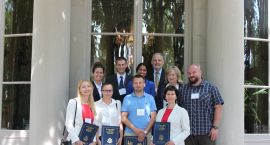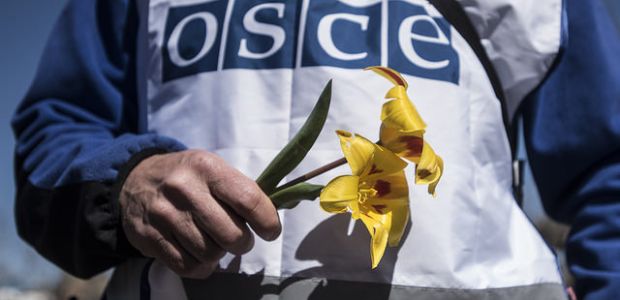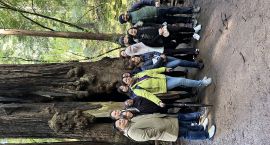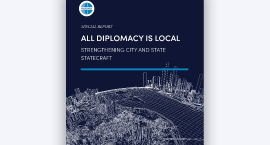On June 12, after months of detailed planning, Meridian International Center unveiled its two-week International Visitor Leadership Program (IVLP) for grassroots organizers from Eastern Europe. The visitors, nominated by the United States Mission to the Organization for Cooperation and Security in Europe (OSCE), came to Meridian to facilitate two-way exchange and to learn more about grassroots advocacy in North America. The visitors came from both different countries and issues areas. There were advocates for the Roma community in Moldova; election observers in Eastern Europe; independent media advocates from Sweden; and trained lawyers who had submitted briefs to the International Criminal Court. In their two weeks together, they bonded with each other over mutual experiences advocating in hardship environments, and met expert organizers who are engaged in some of the most challenging activism work in the United States.
The program’s first highlight was meeting with former congressional candidate, Dr. Suzanne Scholte, who is known for her relentless activism in support of oppressed citizens in North Korea. Dr. Scholte’s firsthand experience organizing in a context where freedom of speech, assembly, and even movement is restricted, allowed her to connect with the visitors. She described dropping money, messages, and supplies via hot air balloons from South Korea, and then coached the group on how to expand their individual organizing efforts. In Dr. Scholte’s case, she turned a single day of protesting for freedom in North Korea into her organization, the North Korea Freedom Coalition (NKFC), which now has over 70 partner organizations in the United States, Japan, and South Korea. Little did the IVLP participants know, five days after their successful meeting with Dr. Scholte, American student Otto Warmbier would die from injuries suffered in a North Korean prison camp. Dr. Scholte’s description of her work, capped by Warmbier’s tragic death, was a sober reminder of the high stakes of her advocacy work. This meeting resonated with the visitors throughout their program.
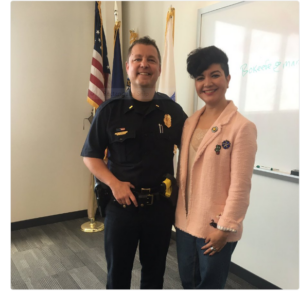
Though Meridian takes pride from the development of innovative and incisive programs designed to inspire and engage our visitors, IVLP programs are also defined by two-way exchange. Visitors attend meetings to understand the experiences of their American counterparts, but equally valuable, they share knowledge of their work in their home countries with the American public. In Salt Lake City, three of the visitors had a chance to share their grassroots work in Eastern Europe when they were featured in a radio show on World Refugee Day. Ukrainian activist Oleksandra Matviichuk described her role fighting for civil liberties in Ukraine, rallying thousands of volunteers to mobilize civic participation for political rights, and reaching nearly 20,000 Ukrainian and Crimean citizens. When asked to discuss her role in her country’s 2014 revolution, she recounted in even tones, her role protesting in the Maidan over long-standing government corruption. During the protest, Ms. Matviichuk was unable to return to her home for a week because the regime had armed men waiting to arrest her. Nevertheless, she has continued her struggle for greater political rights and participation, and was recently named a Democracy Defender in Eastern Europe for her work.
When it was her turn to speak on air, Tamila Tasheva emphasized the power of social media in activism, recounting how her group, Crimea SOS, began as a Facebook page but now has tens of thousands of followers who work with and assist internally displaced Ukrainians, specifically Tatar Muslims. Ms. Tasheva described the displacement of Tatar populations in Crimea by the Russian government, which has a protracted history of discrimination against this population. The final speaker, IVLP participant Marin Alla of Moldova, described his work boosting civil society participation for the Roma community in his country. With a quiet optimism, Marin said positive change in Moldova was not only possible, but happening in real time, as previously held cultural ideas were being broken down in exchange for ones that would serve to accelerate the country’s political growth. Before leaving Utah, the visitors took the opportunity to share more about their lives and struggles during cultural events and home hospitality with local families.
A final stop in Manchester, New Hampshire provided an opportunity to explore an additional challenge that faces both developed and developing countries: homelessness. Participants met with the NGO, New Hampshire Housing Action, which was particularly on point for Hungarian visitor Julia Konkoly-Thege, who is working to end homelessness in her home country. In dialogue with a representative of the U.S. organization, the group explored the differing challenges in their home countries and how to change the narrative around homelessness within communities.
After exploring America’s frontier in Salt Lake City and hearing the quiet hum of a small New England town, the visitors separated and returned to their home countries, ready to continue their missions, buoyed by their U.S. exchange. Over the course of their careers they will undoubtedly have the opportunity to share these experiences and touch thousands more lives.









